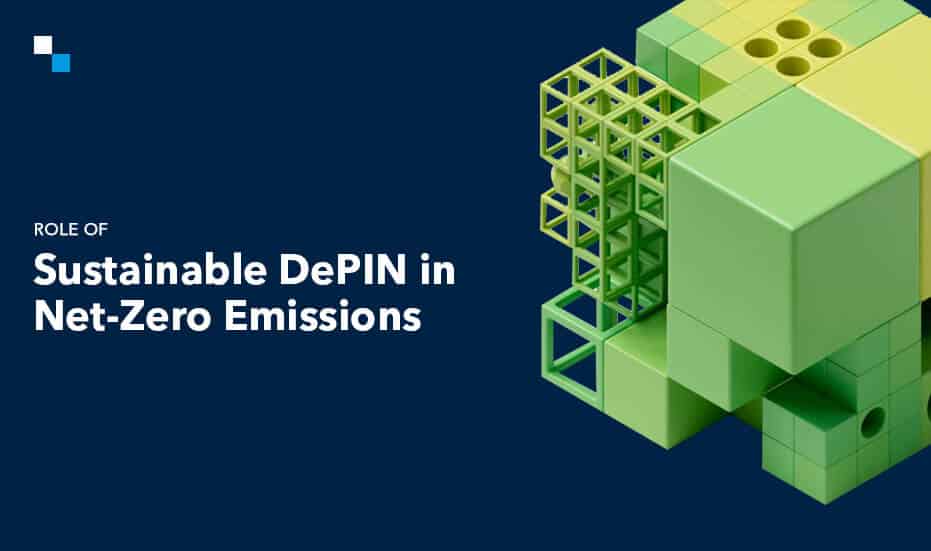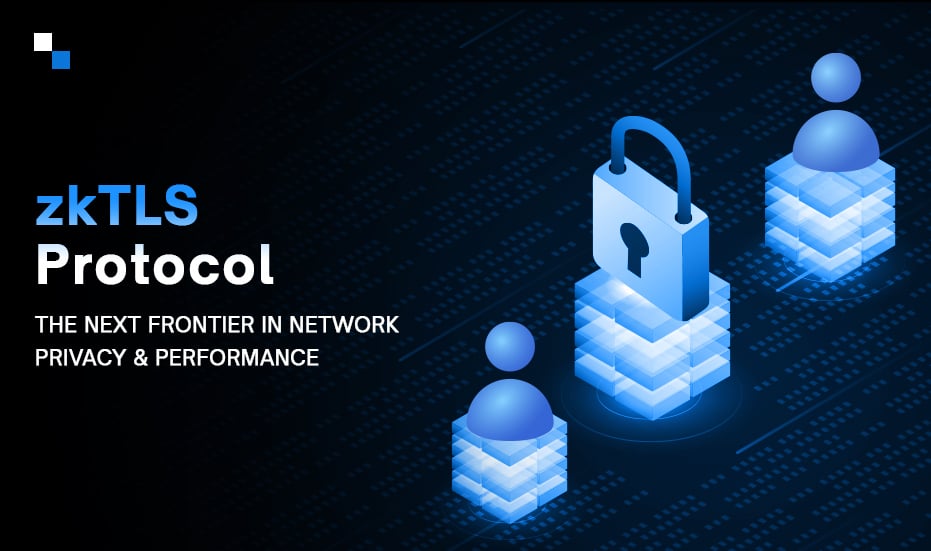
How to Create a Bcoin 2048 Telegram Game in 2 Weeks
October 7, 2024
Bitcoin Restaking: Unlocking New Opportunities in the Crypto Ecosystem
October 8, 2024As the world grapples with the escalating impacts of climate change, the global initiative for net-zero emissions is gathering momentum. This shift highlights the need for new strategies in environmental protection. Enter DePIN(Decentralized Physical Infrastructure Networks) as a transformative solution. It’s a concept that involves creating physical infrastructure networks such as energy grids, transportation systems, or communication networks using decentralized technologies like blockchain.
In the context of DePIN, sustainable development entails designing infrastructure projects that prioritize environmental health, social equity, and economic viability. By harnessing the potential of sustainable DePIN projects, businesses can drive significant advancements toward sustainability while enhancing efficiency and resilience in various sectors. This blog explores the role of sustainable DePIN projects in achieving global net zero emissions goals.
The Role of DePIN in Achieving Net Zero Emissions
Sustainable DePIN projects can contribute to net zero emissions goals in several ways:
Optimizing Resource Utilization
Sustainable DePIN projects enable organizations to optimize resource utilization by distributing energy generation and consumption across decentralized networks. This optimization reduces waste and enhances overall efficiency. For instance, in energy sectors, sustainable DePIN solutions can facilitate the integration of renewable energy sources such as solar and wind into the grid. For instance, microgrid systems powered by renewable energy sources exemplify how sustainable DePIN projects can enhance energy resilience while driving down emissions.
Enhancing Energy Resilience
Building sustainable DePIN projects involves creating infrastructure that is resilient to climate-related disruptions. By employing decentralized energy solutions, organizations can ensure a more reliable energy supply, even in the face of extreme weather events or other disruptions. This resilience is vital for maintaining operations while reducing greenhouse gas emissions. For instance, microgrid systems powered by renewable energy sources exemplify how sustainable DePIN projects can enhance energy resilience while driving down emissions.
Supporting Sustainable Urban Development
Sustainable DePIN projects can play a crucial role in promoting sustainable urban development by integrating smart technologies and decentralized solutions. For instance, sustainable transportation networks that leverage electric vehicles, bike-sharing systems, and public transit options can significantly reduce urban emissions. By investing in sustainable DePIN solutions, cities can build infrastructure that supports a greener and more sustainable future.
Facilitating Collaborative Innovation
Sustainable DePIN projects foster collaboration among various stakeholders. By bringing together businesses, government agencies, and community organizations, sustainable DePIN initiatives can facilitate knowledge sharing, resource pooling, and co-creation of solutions. This collaborative approach is essential for developing innovative technologies and practices that contribute to net zero emissions goals. For instance, partnerships between private companies and local governments can lead to the development of sustainable energy projects that drive emissions reductions.
Reducing Carbon Emissions
DePIN can play a crucial role in reducing carbon emissions by transitioning from fossil fuel-based energy sources to renewable alternatives. Traditional energy systems often rely on coal, oil, and natural gas, which are significant contributors to greenhouse gas emissions. By implementing DePIN, communities can harness renewable energy sources such as solar, wind, and hydroelectric power. For example, a decentralized energy network might involve local solar panels or wind turbines that supply power directly to homes and businesses. This reduces the need for fossil fuels and cuts down on the carbon dioxide released into the atmosphere.
Top 5 Sustainable DePIN Projects
1. Ambient Network

Ambient Network is a cutting-edge DePIN crypto project focused on decentralized environmental monitoring, leveraging the power of a vast sensor network on the Solana blockchain. By capturing hyperlocal air quality and ambient data, Ambient provides real-time, actionable insights to businesses and organizations. Its decentralized infrastructure enables participants to contribute to a global dataset.
2. Element

Element is a secure, decentralized communication platform designed for mission-critical environments, utilizing the DePIN model to offer full control over data and network infrastructure. Built with end-to-end encryption by default, Element ensures that voice, video, messaging, and collaboration remain fully protected across devices. The platform enables organizations to safeguard their sensitive communications while maintaining seamless synchronization between desktop, tablet, and smartphone.
3. WeatherXM

WeatherXM is a DePIN crypto project that creates a decentralized, community-powered weather network, providing precise weather services to Web3 enterprises. By leveraging local weather stations, WeatherXM incentivizes station owners with its native WXM token, fostering a new weather data economy. Station owners contribute real-time, hyperlocal weather data through cryptographic weather stations, earning WXM tokens in return.
4. AquaSave

AquaSave is a pioneering DePIN crypto project that leverages IoT and blockchain technologies to combat the global water crisis. By integrating a network of IoT devices and smart data analytics, AquaSave enables real-time monitoring of water resources, ensuring accurate, data-driven insights for sustainable water management. The platform fosters community-driven participation, rewarding users who contribute to water conservation efforts.
5. Silencio

Silencio is a decentralized physical infrastructure network leveraging web3 technology to tackle global noise pollution. Powered by over 40,000 mobile users across 175 countries, Silencio rewards participants for providing accurate, hyper-local noise data through the Silencio app. This data is used to generate a comprehensive noise pollution map, offering valuable insights for real estate valuation, hotel and restaurant selection, and urban planning to create more livable cities.

How Antier Helps Businesses in DePIN Adoption and Development?
Antier plays a pivotal role in helping businesses adopt and develop Decentralized Physical Infrastructure Networks by offering comprehensive blockchain solutions and expertise. Here’s a detailed explanation of how Antier assists businesses in this transformative journey:
Strategic Consultation and DePIN Feasibility Assessment
Antier begins by understanding the unique challenges and objectives of a business. The team provides tailored consultations to determine the viability of adopting a DePIN model. Antier works closely with businesses to identify specific use cases where DePIN can offer significant value.
Custom DePIN Development Solutions
Once the strategy is established, Antier moves into the development phase, creating customized DePIN solutions based on the client’s specific requirements. Antier integrates blockchain technology into the core infrastructure of the DePIN. Blockchain ensures data security, transparency, and immutability, which are crucial for decentralized infrastructure.
Smart Contract Development
Smart contracts are essential to automate transactions and agreements within DePIN ecosystems. Antier’s developers design and deploy smart contracts that govern the rules of data exchange, incentivization, and network participation, ensuring trustless interactions between participants.
Seamless Integration with Existing Business Infrastructure
Adopting a DePIN model doesn’t mean overhauling existing business infrastructure. Antier ensures that the transition is smooth and the decentralized network integrates seamlessly with the business’s existing systems. Antier ensures that DePIN networks are compatible with the company’s legacy infrastructure, minimizing disruptions during implementation.
Scalability and Future-Proofing
Antier understands that scalability is crucial for the long-term success of DePIN projects. The team designs DePIN solutions with future growth in mind ensuring that the infrastructure can scale as the business and its network expand. Antier builds DePIN networks using modular architecture, which allows businesses to add new features, services, or geographical areas without disrupting the entire network.
Conclusion
The role of sustainable DePIN projects in achieving global net zero emissions goals is increasingly recognized as a vital component of the broader sustainability agenda. As businesses and governments navigate the complexities of climate change and resource scarcity, investing in sustainable DePIN development is not only a strategic imperative but also a moral obligation.



